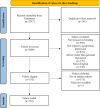Postpartum Depression and Maternal-Infant Bonding Experiences in Social Media Videos: Qualitative Content Analysis
- PMID: 40372988
- PMCID: PMC12122829
- DOI: 10.2196/59125
Postpartum Depression and Maternal-Infant Bonding Experiences in Social Media Videos: Qualitative Content Analysis
Abstract
Background: While the negative effects of postpartum depression on maternal-infant bonding are well-documented, our understanding of how it exerts these effects remains incomplete. A better understanding of how maternal postpartum depression affects bonding can enable clinicians to better identify and support mothers with difficulties bonding with their children.
Objective: This study aims to describe the bonding experiences of mothers with postpartum depression through an analysis of short-form videos and user engagement.
Methods: We collected publicly available highly-viewed TikTok videos using hashtags associated with postpartum depression and associated engagement metrics in May 2023. After manual screening, we extracted 533 videos related to the mother-infant bond, from which we analyzed a random subset of 159 videos. We abstracted categories from videos using a hybrid deductive and inductive approach. Negative binomial regression models of video likes, views, shares, and comment count were used with content categories and the creator's numbers of followers as independent variables.
Results: Abstraction of content from mother-infant bond videos resulted in six categories: (1) navigating anxiety and anger, (2) creating physical and emotional boundaries, (3) overwhelmed by demands of caregiving, (4) subverted expectations, (5) enduring and finding strength through the challenge of postpartum depression, and (6) can't remember early life. Subverted expectations and navigating anxiety and anger categories were associated with increased views (rate ratio [RR] 1.72, 95% CI 1.22-2.43; RR 1.61, 95% CI 1.09-2.38, respectively), likes (RR 3.61, 95% CI 2.55-5.11; RR 3.96, 95% CI 2.69-5.85, respectively), shares (RR 2.95, 95%CI 2.09-4.18; RR 2.45, 95% CI 1.66-3.61, respectively), and comments (RR 2.78, 95% CI 1.97-3.94; RR 1.89, 95% CI 1.28-2.79, respectively). Sensitivity analysis with creators with fewer followers mostly aligned with these results.
Conclusions: This qualitative content analysis of short-form videos identified specific ways postpartum depression impacts the mother-infant bond, highlighting strategies for clinicians to support bonding. Analysis of engagement metrics further demonstrated the types of experiences that most resonate with viewers. Our findings demonstrate the potential of this qualitative method to augment understanding of lived experiences.
Keywords: TikTok; anxiety; bonding; content; content analysis; deductive; depression; experience; inductive; maternal-infant; perinatal depression; postpartum; postpartum anxiety; postpartum depression; qualitative; regression model; social media; video.
© Kunmi Sobowale, Jamie Sarah Castleman, Sophia Yingruo Zhao. Originally published in JMIR Infodemiology (https://infodemiology.jmir.org).
Conflict of interest statement
Similar articles
-
The relationship between maternal-infant bonding and postpartum depression/anxiety: moderating effect of childhood psychological abuse and validation of the Mother-to-Infant Bonding scale (MIBS-8) in Arabic.BMC Psychiatry. 2024 Apr 17;24(1):293. doi: 10.1186/s12888-024-05745-9. BMC Psychiatry. 2024. PMID: 38632592 Free PMC article.
-
Factors affecting mother-infant bonding in a Polish group of mothers.Sex Reprod Healthc. 2023 Sep;37:100880. doi: 10.1016/j.srhc.2023.100880. Epub 2023 Jun 23. Sex Reprod Healthc. 2023. PMID: 37392584
-
Mothers with Breastfeeding Difficulty Report Increased Depressive Symptoms and Impaired Maternal-Infant Bonding on Social Media.J Womens Health (Larchmt). 2025 Jan;34(2):251-260. doi: 10.1089/jwh.2024.0151. Epub 2024 Oct 22. J Womens Health (Larchmt). 2025. PMID: 39435513
-
Associations of postpartum mother-infant bonding with maternal childhood maltreatment and postpartum mental health: a cross-sectional study.BMC Pregnancy Childbirth. 2019 Aug 5;19(1):278. doi: 10.1186/s12884-019-2426-0. BMC Pregnancy Childbirth. 2019. PMID: 31382903 Free PMC article.
-
Perinatal posttraumatic stress disorder as a predictor of mother-child bonding quality 8 months after childbirth: a longitudinal study.BMC Pregnancy Childbirth. 2024 May 25;24(1):389. doi: 10.1186/s12884-024-06570-4. BMC Pregnancy Childbirth. 2024. PMID: 38796417 Free PMC article.
References
MeSH terms
LinkOut - more resources
Full Text Sources
Medical


